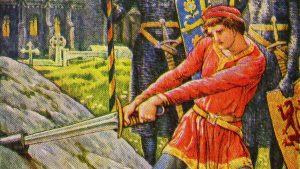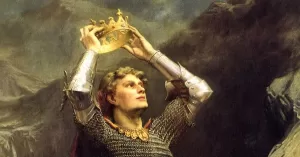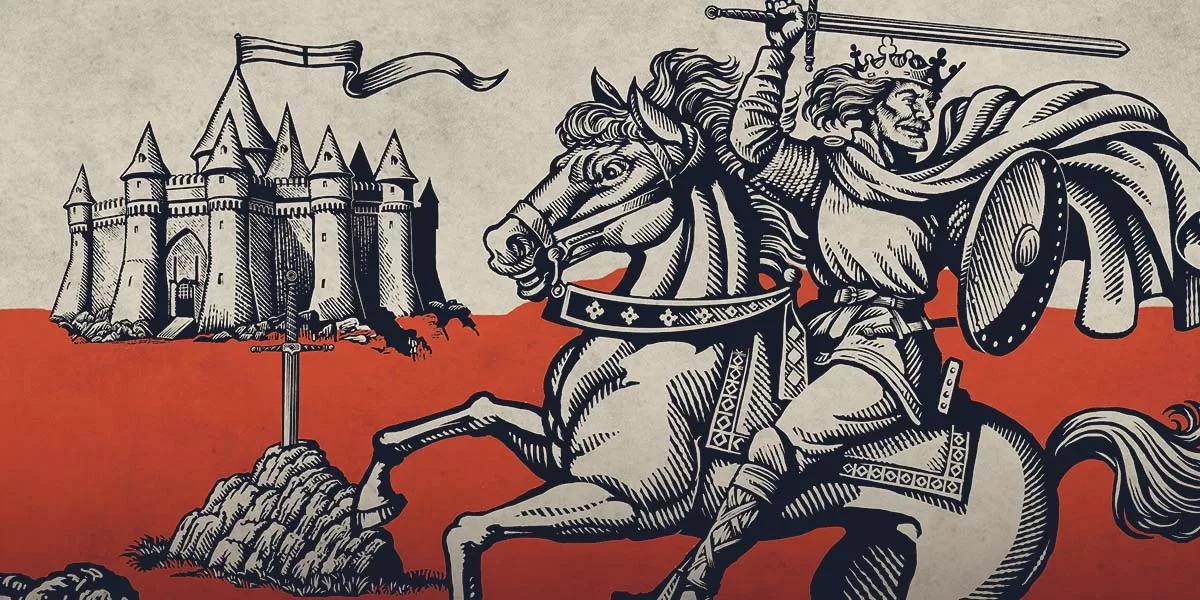“As a being, as an extension of all of Being, man has an organismic impulse to take into his organization the maximum amount of the problematic in life. His daily life, then, becomes a daily duty of cosmic proportions, and his courage to face the anxiety of meaninglessness becomes a true cosmic heroism.” – Ernest Becker, The Denial of Death
The very name Avalon has become, to the mythically inclined, synonymous with an incantation. A magical spell that lifts the spirit from this plane to a plane of myth, where visions of the magical island are conjured up. An island thick in legends of glorious kings and the sound of horns resounding with hymns of heroism. Every cove and every hill is steeped in mystery, a place so deeply inspirational that it can light the flame of bravery in the weakest of hearts, not just because of the allure of the white shores, not because of the teeming forests full of elves and faeries, but because of what was forged in the deepest, most secret chasms by an Avalonian Elf; the magical sword Excalibur.

Various versions can be found in the rich mythological literature surrounding Arthur. It is, however, the universal theme of Arthur that pulls the sword out of an anvil or rock as proof he is the true heir of Uther Pendragon that is of importance. It is a theme that can be found in a great many stories and myths. The theme of a test of worthiness to prove that the aspiring wielder was of sufficient wisdom and purity to bear the burden of such great power and responsibility is ubiquitous in ancient myths and stories.
Many readers have been swept away into the fantastical domain of magical stories by the many timeless iterations of this myth. Merlin and Arthur, Tolkien’s Fellowship of the Ring, Thor’s hammer, Yoda and Luke, The Neverending Story, The Chronicles of Narnia, Jason and the Golden Fleece, etc. – all share the concept of proving one’s worthiness and of rising to the challenge. To be worthy of the gift of power or wisdom, one had to prove one’s worthiness by sacrifice and overcoming oneself. In essence, to let the old self die and be reborn as the proper wielder of a new self that was deemed worthy.
More modern variations on this theme are to be found in the Matrix cinematic trilogy. Throughout three parts, the character of Neo evolves from an ignorant nobody to fulfilling the prophecy of “the one.” Neo evolves from a humble cubicle dweller, living a life of rote repetition, to finding the courage and ability to fight the machines. In order to begin his quest to become “the one,” he must be unplugged from the matrix. He is asked to let the old Neo die and accept that the real Neo is a creature he has been a stranger to all of his life. He is reborn and shown the wisdom of life outside the matrix, and so becomes an initiate. The machine-Zion war that is imminent is also unavoidable, so Neo must overcome all of his fears and has to make the ultimate sacrifice in order to get peace. This is a very ancient theme wrapped in a very compelling modern story.
One of my favorite proofs of worthiness and kingship is Tolkien’s Aragorn. He is the true heir to the throne of Gondor, the white city, yet he lives a life of wandering and solitude. He prefers to live a life of shadow and obscurity as he deems himself unworthy of the crown. Yet fate has other plans, and in Gondor’s deepest, darkest hour, destiny calls him, and he is presented with the sword that has been reforged from the shards of Narsil, the sword of the kings of Gondor. Aragorn renames it Andúrill and accepts his kingship. He, as king and wielder of the sword, can now command an army of the dead to defeat the armies of Mordor. Again, a sword is a symbol of worthiness and transmission of kingship. The sword is symbolic of the justification to rule based on his blood, purity, and worthiness.
Reading Tolkien, often the white shores of Avalon and the legend of Excalibur can be glimpsed through the mythical veils of Middle-Earth, and one is often reminded of Arthurian legend in Tolkien’s writings, perhaps most notably in the character of Gandalf, who is clearly inspired by the Merlinian archetype. With Gandalf, we again find the passage from one life to another through a transformational event. In this case, he dies fighting a fiery demon from very ancient times. When he returns, he changes from Gandalf the Grey to Gandalf the White. White is here used symbolically for purity and wisdom. By conquering death, Gandalf acquired knowledge of death and, therefore, wisdom that can never be attained by a mere earthly life. He has transformed, let his old self die, and has returned worthy of the title Gandalf “the White.”
Tales of kingship, heroism, worthiness, and transcendence are as old as stories themselves. They are reflective of everlasting intransient values that great men have strived for since time immemorial. Values that spring from the eternal well of existence and have always been to the noblest of men as honey to bees. The restless blood of our forebears has always been stirred by vortices of values that whipped up an uncontrollable urge to explore, improve, build, and create.
Rites of initiation have been an integral part of proving one’s worthiness of wisdom and eternal values. They were imperative to establish if you were even capable of apprehending what the values entailed and what they meant. An impure soul was not to be let anywhere near the transcendental wisdom the initiates guarded. The initiates were as far removed from the lowest castes as the lowest caste from monkeys. When examining ancient wisdom traditions, one finds that rites of passage were virtually always an indispensable part of the tradition. The whole concept of initiation was not just about wisdom but also from boy to man, girl to woman, from martially inept to fierce warrior, etc. Historically, the most notable people in the tradition of initiation were probably the Egyptians. The pyramids, according to local traditional culture, were objects that focused a type of energy that would lift the consciousness of the person who was in the “sarcophagus” to exceptional planes of existence. The entire Egyptian priest class was exceedingly strict in guarding the wisdom and made sure not to let the impure near them.
The sword in the Arthurian myth is very much a symbol of wisdom, for a sword cuts through that which should be whittled away to get to the truth. It is a symbol of discernment, justice, and courage. In myths of initiation, one finds these magical objects everywhere. Objects embued with transcendental values and sacred truths. The granting of these objects was to mark in time the moment one was deemed worthy of the gift of wisdom, entwining the eternal with the ephemeral. As such, the wielder of such a powerful symbol, like the sword Excalibur, was regarded as the most noble of men and rightfully crowned king.

In modernity, worthiness is gifted at birth. As soon as the light of our precious sun hits the eyes of a newborn, he is destined to have his natural body clad in the cloaks of “citizenship.” The absorption into the body politic automatically confers the right to vote when the child lawfully becomes an adult. A mere administrative mutation confers the right to self-determination to the newfangled “adult.” Such is the cultural debasement we have reached – a world where an insignificant clerk confers adulthood and not the parents, elders, or priests.
Adulthood, with all its “rights,” is granted to every halfwit able to tie his shoelaces. Citizenship is deprived of all its meaning, as the ancient Athenians understood very well that only free men of good standing could be citizens. Now, we have turned the workshy, lazy, immoral, and feral underclass into citizens and given them the right to vote. No right-minded Athenian would have ever conceived of giving citizenship to the underclasses.
In modern times, the selection of statesmen is just as meaningless as the conference of citizenship. No statesmen are required to take any test or prove their worthiness. They don’t even need to know anything about the subject of their ministries. Our political houses are filled to the brim with clowns and staggering ineptitude. They are miserable, dreary people skulking in the shadows of the governmental buildings. Their slimy fingers are dedicated to the dark occult craft of policy-making. Restless shall they persist until all human conduct shall be captured by policies and regulations. Utopia is, in their eyes, an administrative endeavor. Unworthy men are trying to impose their values on existence, as the eternal values are too difficult for them.
Our times are in dire need of reinstituting the tests of worthiness, of gathering the worthy and granting them the gift of power and responsibility. We must teach our children all the European myths about heroes and kings, glory and sacrifice, trial and honor. We must strip the unworthy of any power. Our children must learn that there is no real progress without sacrifice. Life, as Europeans, should be about perpetual growth as humans. They must learn that economics is just a tool to supply our needs to lead lives of striving to the highest standard attainable. Stories of myth and lore are excellent at imparting values and dreams to our children. So myths must be told and must be written; they are quintessential for our continued existence.









